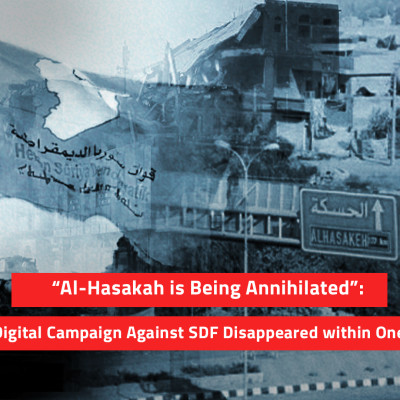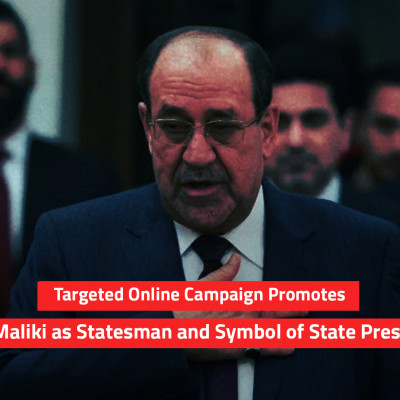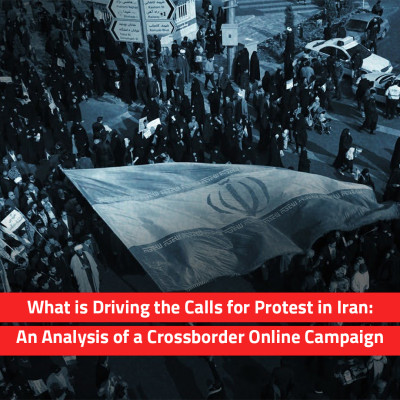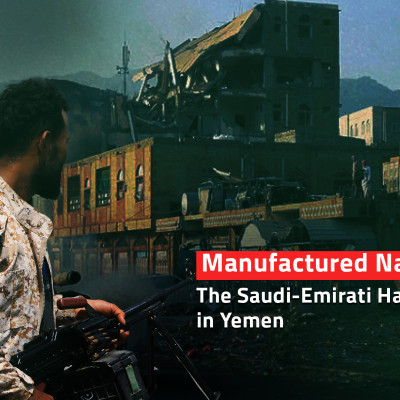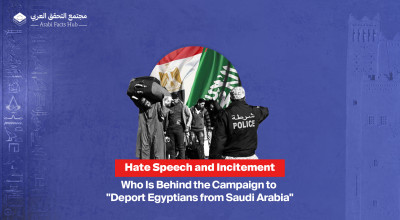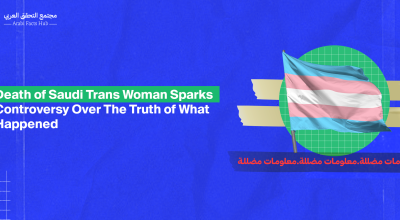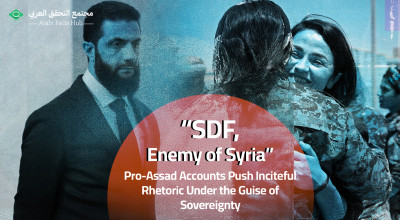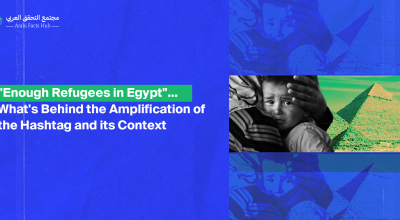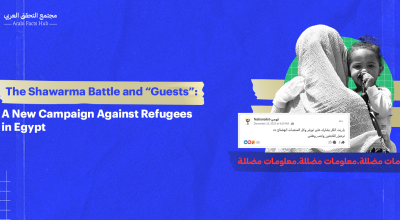Muawiya TV Series: Sectarian Tensions and Coordinated Activity from Telegram to Twitter
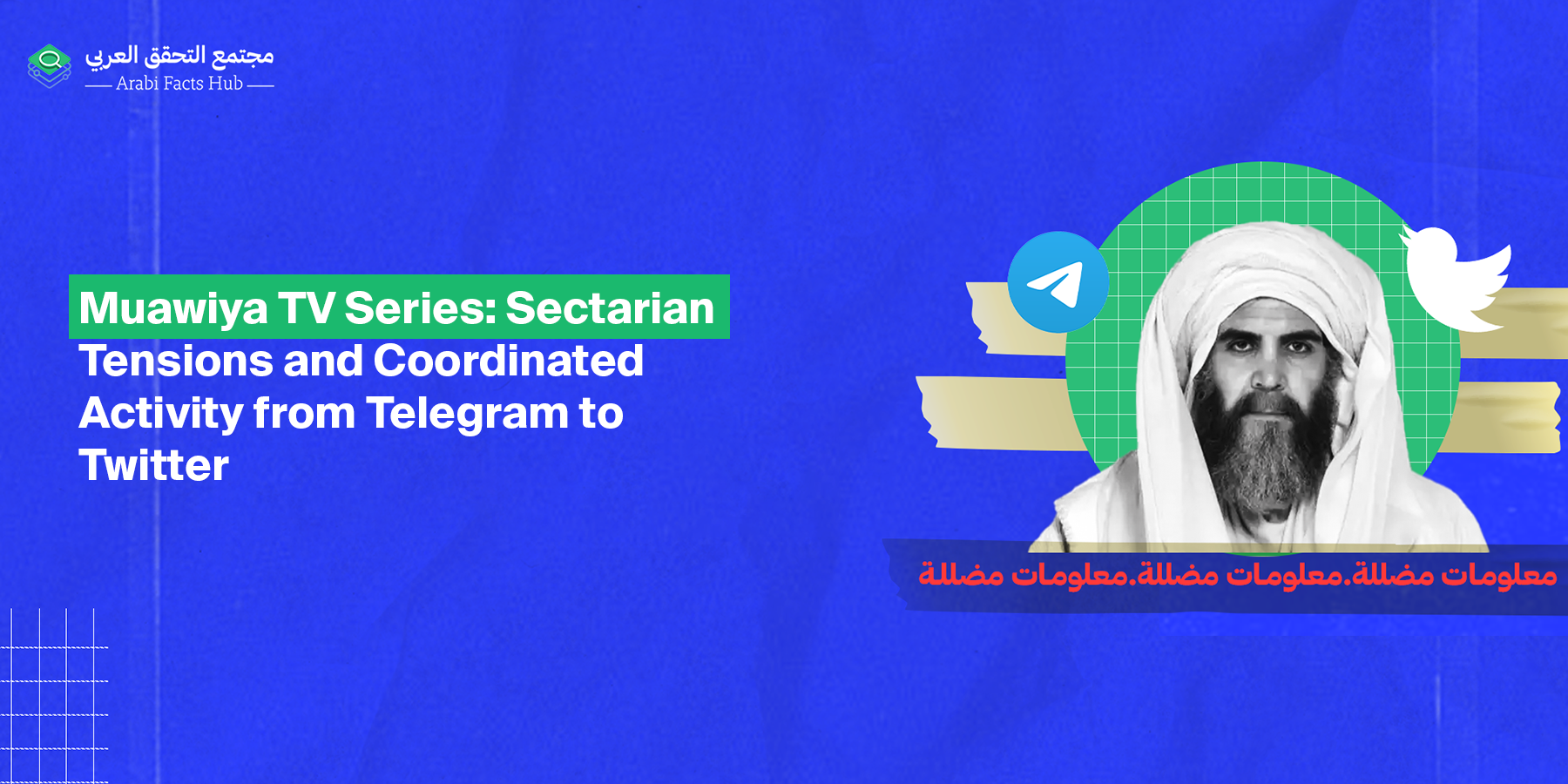
This is part of a series of investigative reports published in collaboration with Daraj media
The controversy surrounding the series Muawiyah was accompanied by a dispute over the narrative and context, even before the show was aired. This took place amid divisive opinions influenced by political agendas regarding the drama, which was originally scheduled to be broadcast during the last Ramadan.
____________________________________________________________________________
The TV series "Muawiyah," which was produced by the Saudi MBC network, sparked religious and sectarian controversy due to its connection to the historical figure Muawiyah ibn Abi Sufyan, the founder of the Umayyad Caliphate (661 – 750). The series depicts his role during a crucial period in Islamic history, when Muslims faced internal conflicts and power struggles for the caliphate following the murder of Uthman ibn Affan and Hussein ibn Ali, as well as the battles of Karbala, the Camel, and Siffin.
The controversy surrounding the series Muawiyah was accompanied by a dispute over the narrative and context, even before the show was aired. This took place amid divisive opinions influenced by political agendas regarding the drama, originally scheduled to be broadcast during the last Ramadan.
At least eight active hashtags were associated with the series, including #Muawiyah_ibn_Abi_Sufyan, #Muawiyah_series #Muawiyah_the_shoe_of_believers #Muawiyah_the_shrewd_of_Arabs, #Muawiyah_recorder_of_revelation, #Muawiyah_cause_of_sectarian_strife, and #Muawiyah_cause_of_strife
On "Twitter," these hashtags collectively spread across more than 39,000 tweets, including at least 10,000 original tweets and over 28,000 retweets, garnering approximately 105,000 likes, generated by 6,074 accounts.
Our analysis reveals coordinated activity and competition to amplify these hashtags in an organized and regional manner, particularly from Iraq, Saudi Arabia, and Yemen. The analysis focuses on the prominent hashtags rather than all of them.
What happened?
With the circulation of promotional ads for the drama, which was reported to have the largest production budget in the history of Arab drama (100 million dollars according to press reports), calls emerged to ban the series that was filmed in Tunisia. The criticism directed at the series was associated with a call made by Muqtada al-Sadr, the Iraqi Shii leader, on Twitter to stop it. Al-Sadr’s statement, posted on February 14th, urged MBC network not to broadcast the series. Al-Sadr, known as the “King Maker” in Iraqi politics, is not an ally of Iran. He has a long history of political and ideological disputes with factions close to Iran in Iraqi politics. He maintains good relations with officials in Saudi Arabia.
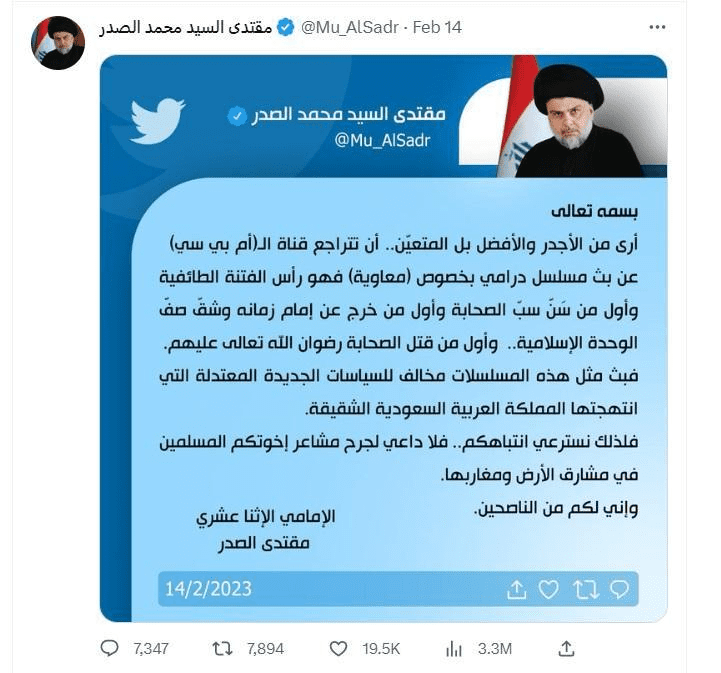
From Telegram to topping Twitter’s trends in 28 minutes
Despite the repeated claim of being "spontaneous," the campaigns of the Al-Sadr Movement on social networks appeared highly coordinated. When Al-Sadr tweeted at 7:00 PM local time, it took only 28 minutes for the topic to trend and top the list of the most discussed topics on Twitter.
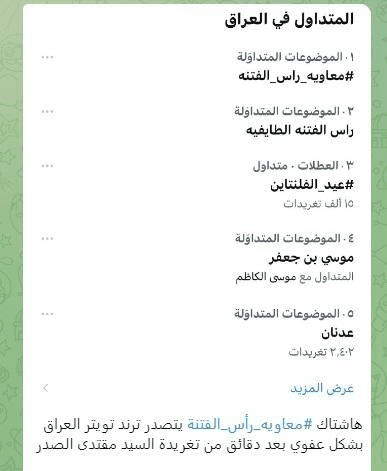
A month after its appearance, the hashtag #Muawiyah_cause_of_strife, which used the phrase mentioned in Al-Sadr's statement, gathered more than 6,023 tweets, 9,471 retweets, and 44,294 likes.
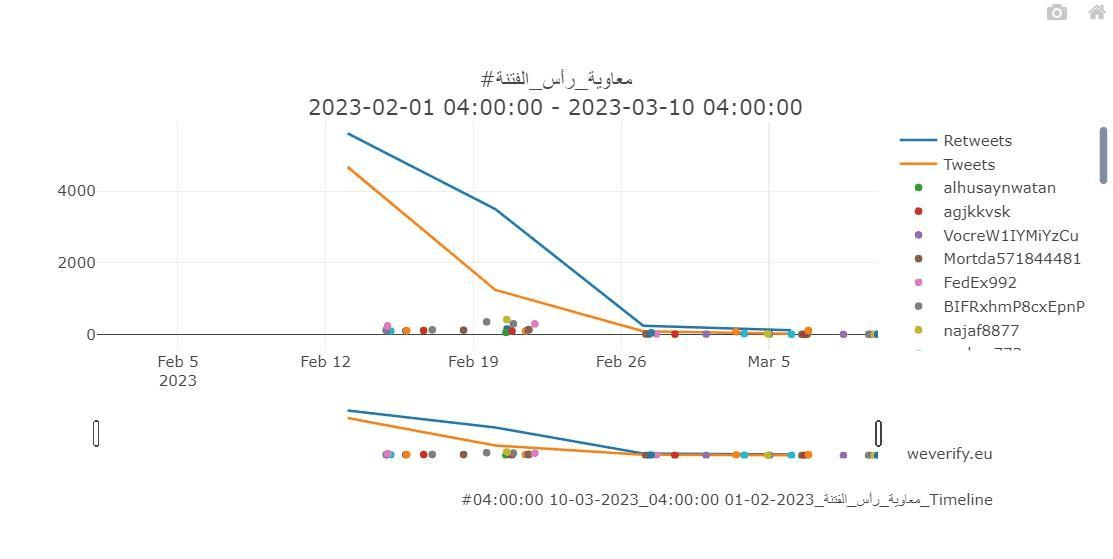
A graph of the activity on the hashtag #Muawiyah_cause_of_strife – InVID
Some of the 3,474 accounts that used the hashtag #Muawiyah_cause_of_strife posted images of Muqtada Al-Sadr rallying his supporters to participate in the anti-series tweet campaign. Many of these accounts do not have a large following, and their owners do not share personal photos. However, these accounts have participated in previous campaigns expressing the ideas of the Al-Sadr Movement.
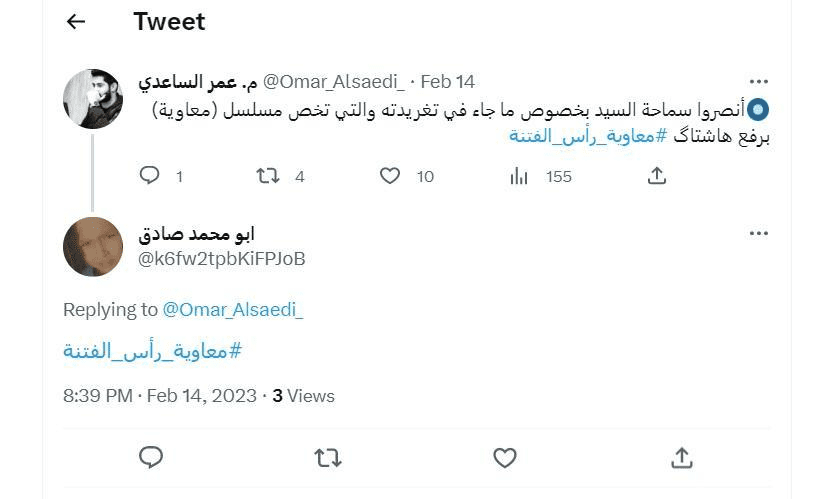
The organizers of the hashtag campaign took various measures to push it to trend on Twitter. One of these methods involved summoning automated accounts or bots to join the campaign to help amplify its reach and impact. As a result, dozens of tweets would be posted by a single account. In some cases, the number of tweets from each account reached 100 tweets, which is an unusual rate. The automated accounts were programmed to post tweets containing the hashtag without necessarily including phrases related to its topic. In some cases, the tweets were limited to using symbols and numbers. For example, the account @Fl2l5ULnKJXZ8sz published 100 tweets, with hashtags and the numbers from 1 to 100, as well as emoticons.
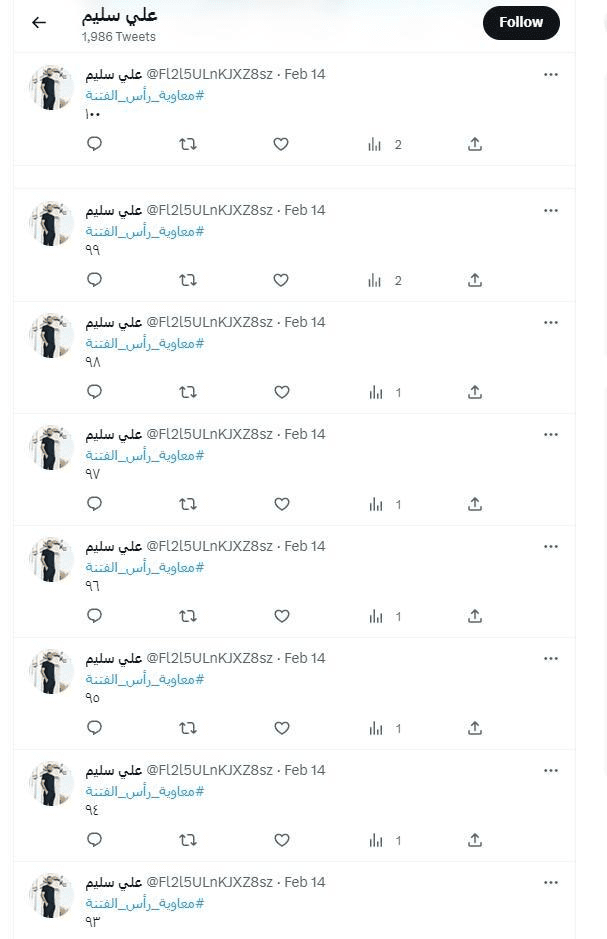
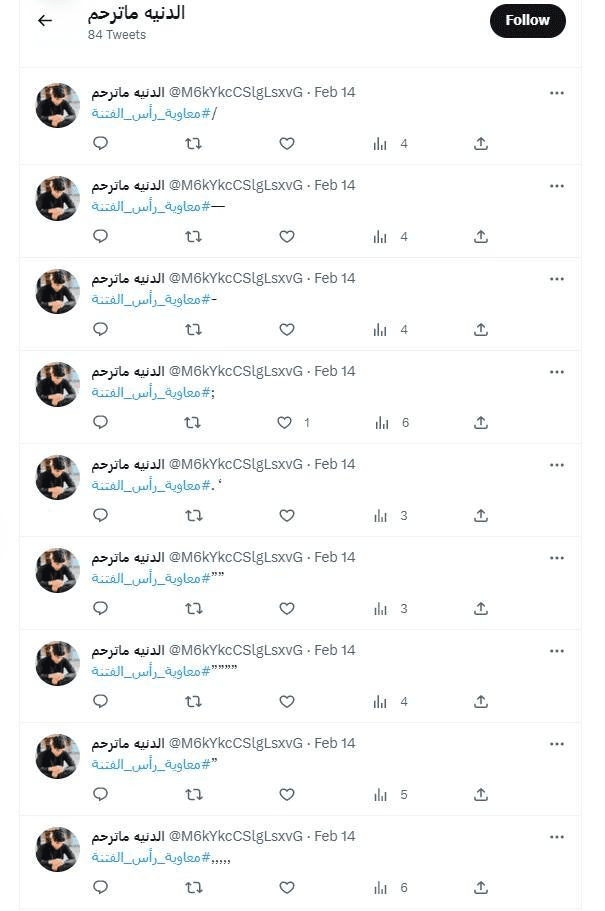
Despite posting only one tweet about the series, the leader of the Al-Sadr Movement had a significant impact, receiving 424 comments containing the hashtag #Muawiyah_cause_of_strife.
Kuwaiti journalist Fajr Al-Saeed ranked second after Al-Sadr in terms of the number of comments containing the hashtag (44 comments). The account of Al-Hurra channel received 39 comments, and Al-Hurra Iraq received 29 comments. The account of the Lebanese newspaper Al-Nahar received 21 comments.
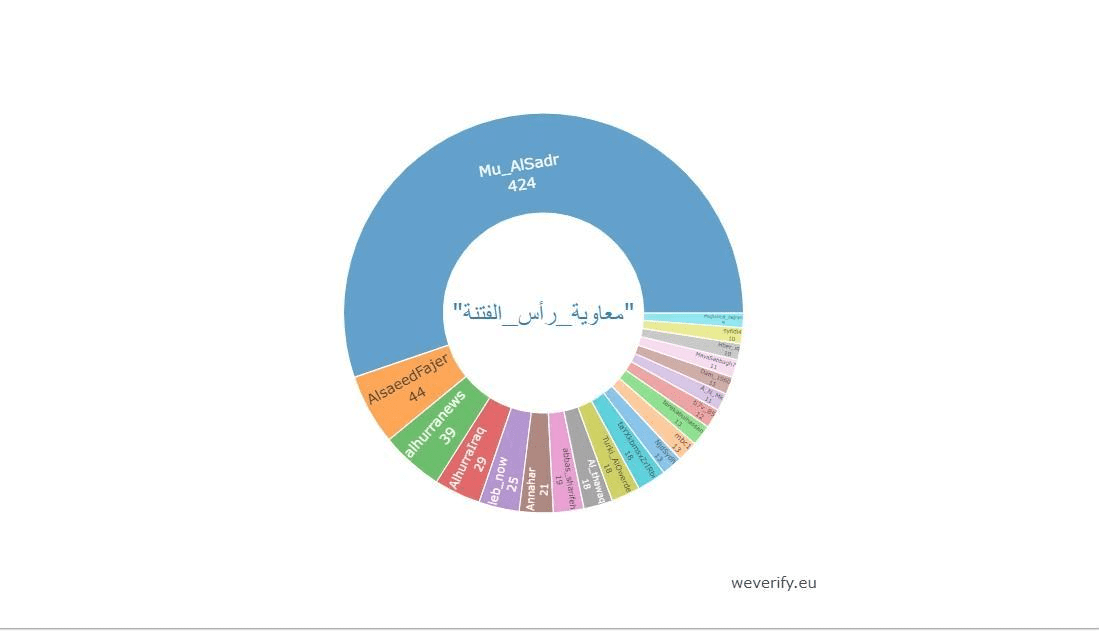
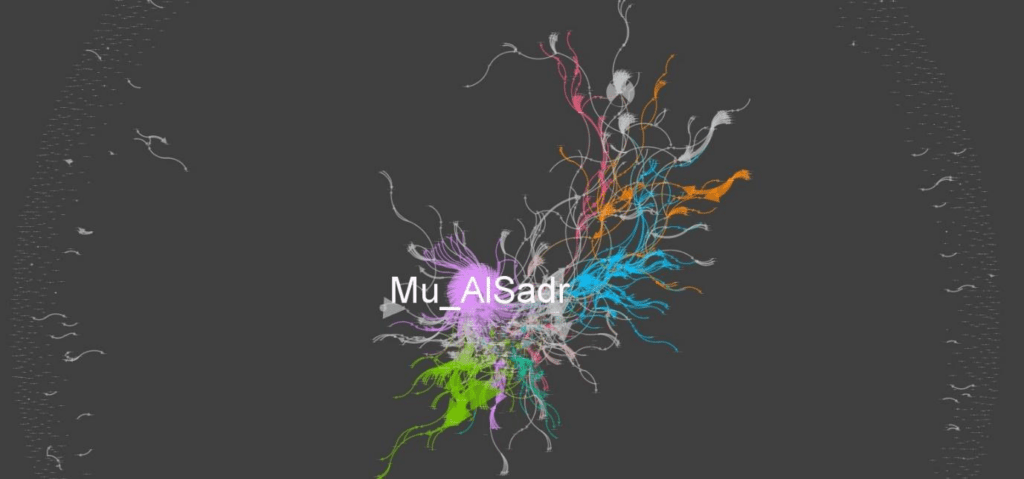
Diagram showing the interactions between accounts using the hashtag – Gephi
Posts ready for publication
A group closely affiliated with the Houthis in Yemen started a separate campaign, attacking the series and the Kingdom of Saudi Arabia. The Houthis coordinate their online activities through a channel on the Telegram app named "Resistance Tweets Bank," with 389 subscribers. Before launching the campaign, which called for boycotting MBC, the group had already prepared posts that relied on well-crafted texts and graphic designs, ready for immediate publication on "Twitter."
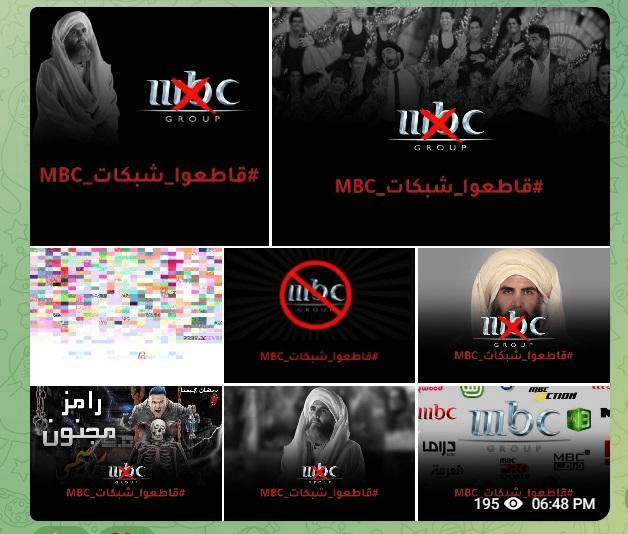
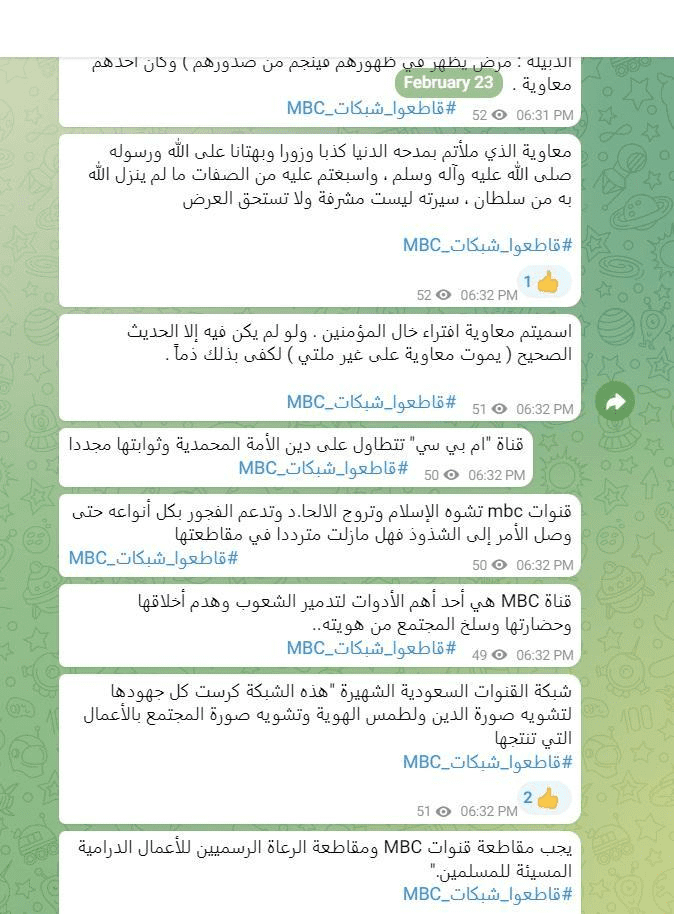
"Al-Hashd" later decided to launch the campaign on Thursday, February 23rd, using the hashtag #Boycott_MBC. A link to the Telegram channel was promoted on Twitter, allowing participants in the campaign to access ready-made tweets to be posted at the specified time. Only 352 accounts participated, broadcasting more than 8,000 tweets, including 1,569 original tweets, 6,546 retweets, and 14,685 likes. Verified, blue-check accounts, subscribed to the "Twitter Blue" service, also participated in the mobilization and tweeting campaign. Examples include accounts like @QueenEmmy333, @sel_ma88, and @azizdopipe
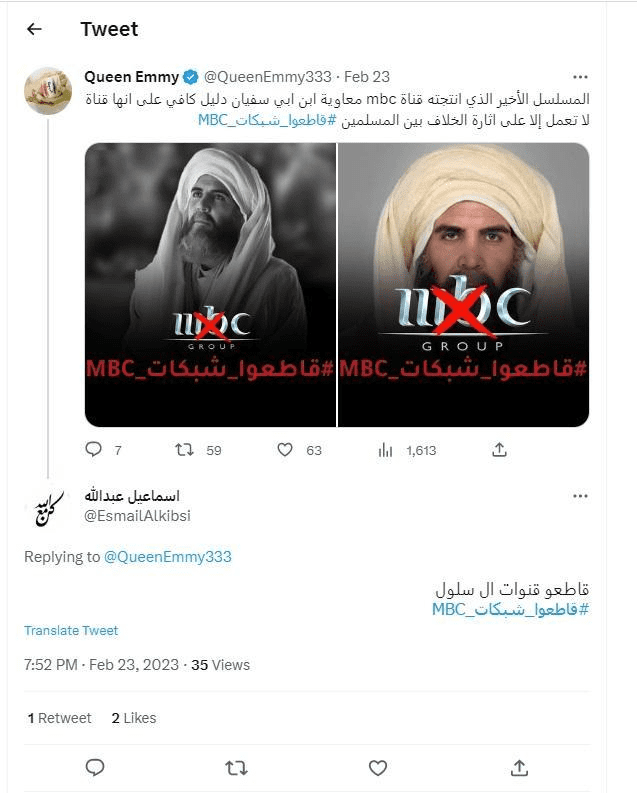
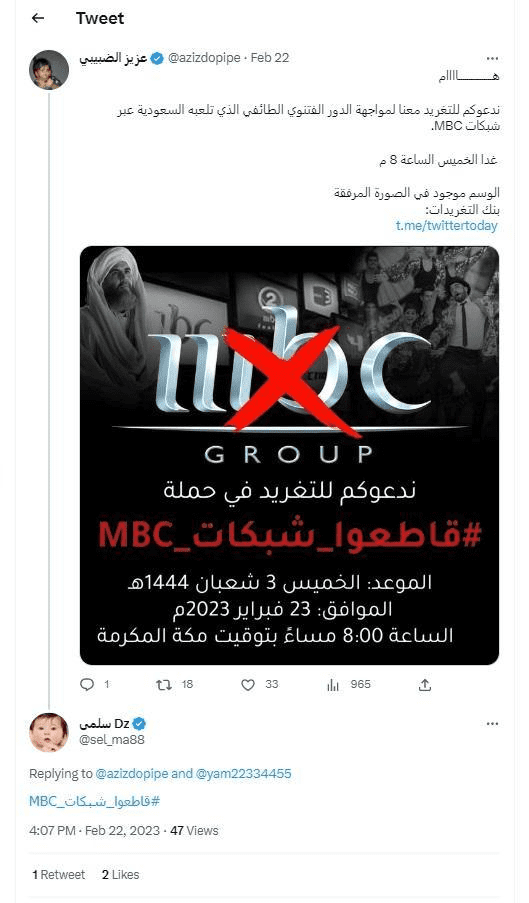
The believers’ uncle
In response, some hashtags defending Muawiyah ibn Abi Sufyan and criticizing his critics appeared, such as the hashtag # Muawiyah_is_the_believers_uncle. A total of 1,246 accounts participated in tweeting with this hashtag, resulting in 1,652 original tweets, 6,473 retweets, and 17,570 likes.
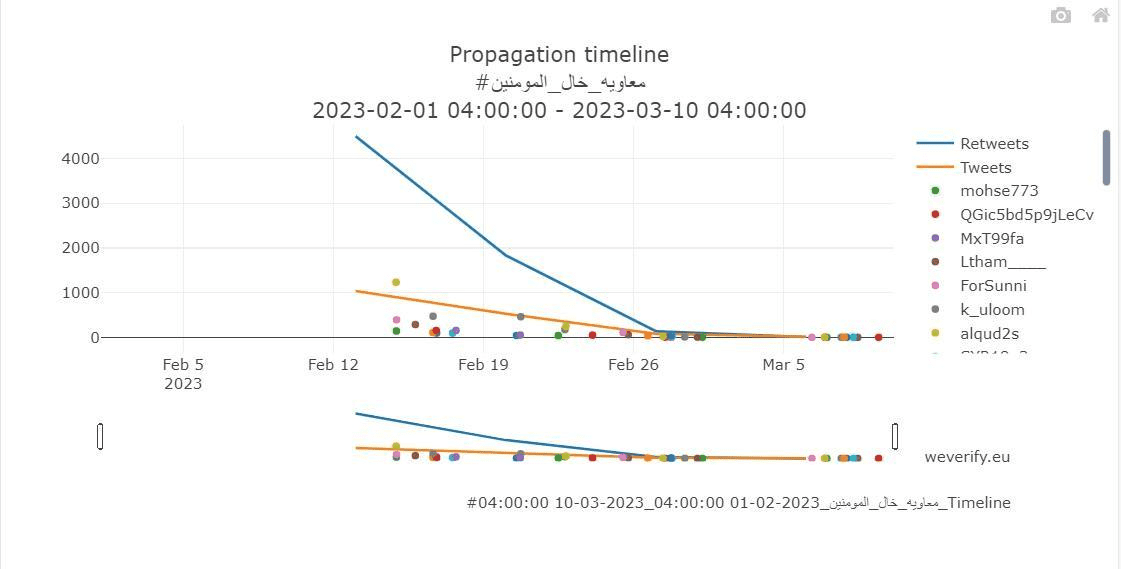
Illustration showing the activity on #Muawiyah_is_the_believers_uncle – InVID
Sunni accounts from various Arab countries participated in the campaign to defend Muawiyah and the series. Most of the participants came from Saudi Arabia, as well as from Algeria. Some tweets called for Iraq to be federalized while condemning bias against Sunnis in the country. There were accounts that had previously participated in campaigns related to Saudi Arabia, or that shared positive content about the Kingdom, such as @SufianSamarrai, @NazJaf4, and @Kawkawa2024.
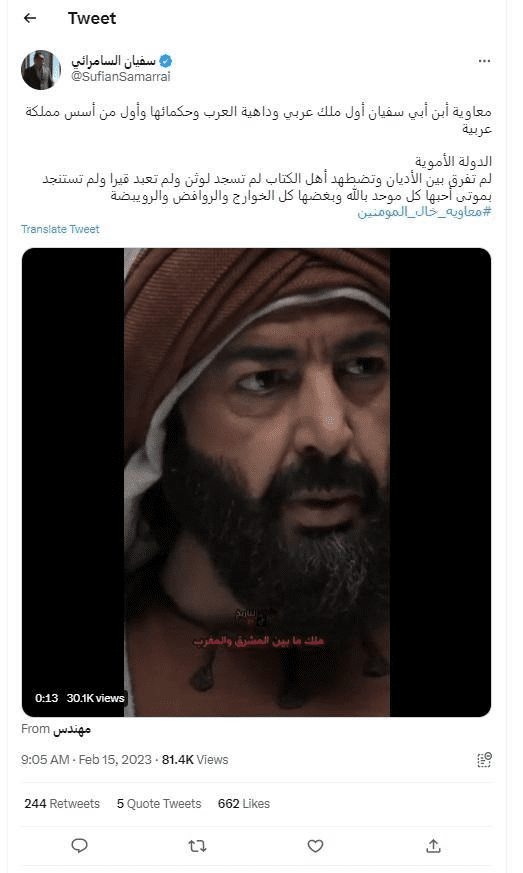
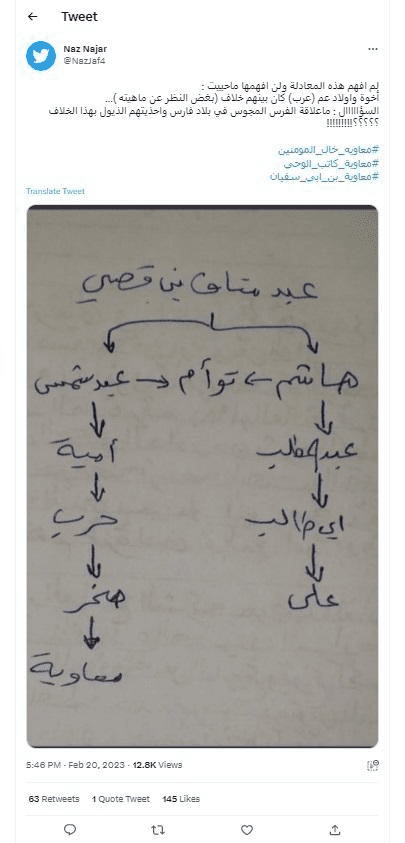
The tweets, especially those in the form of replies or comments, gained significant traction, in addition to the repeated posting of hashtags defending the character of Muawiyah. Videos featuring one of the Sunni leaders in Iraq, Taha al-Dulaimi, circulated during this time.
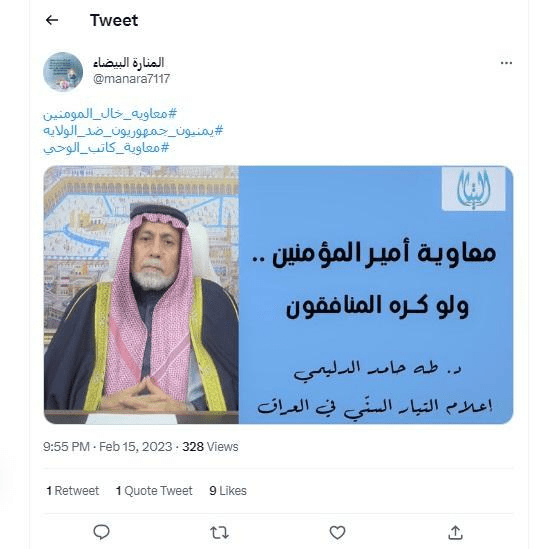
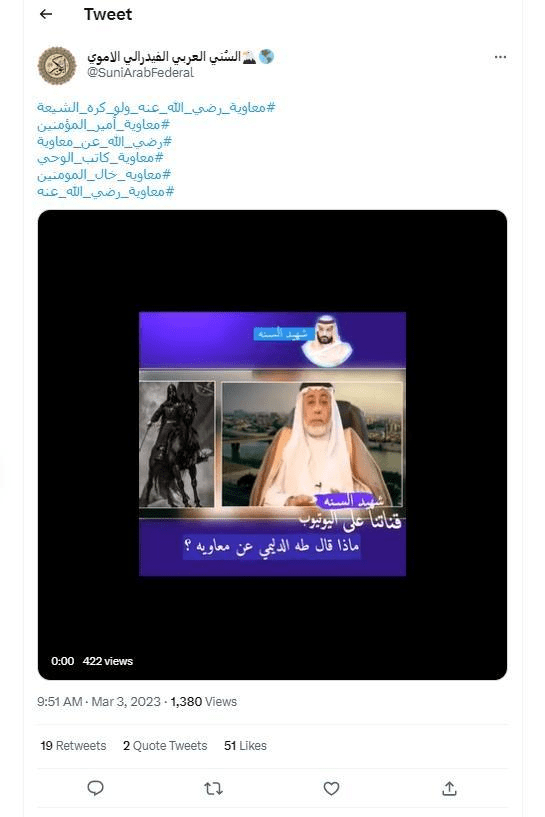
In summary:
- Organized campaigns both criticizing and defending the series and the character of Muawiyah ibn Abi Sufyan, creating a sectarian tension.
- The campaigns relied on automated accounts (Bots) to amplify the spread of hashtags.
- Launching campaigns coincided with Muqtada al-Sadr's negative tweet about the series.
- Telegram channels were used as a gathering point to coordinate and launch campaigns against the drama.
- Muqtada al-Sadr was one of the most influential figures in the ongoing debate about the series and the character of Muawiyah.
- In addition to Iraq, there were other campaigns rejecting the series in Yemen, associated with the Houthis.
- The Yemeni campaign prepared textual and visual tweets ready for immediate broadcast through participating accounts.
- Many participating accounts were part of previous electronic campaigns or shared positive content about Saudi Arabia.
Tools used
InVID Verification Plugin
Twitter Search
Tweetdeck
Gephi
